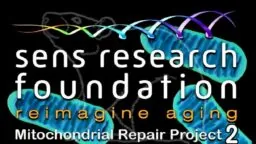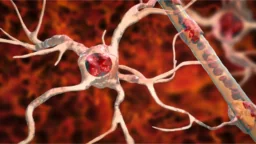Rejuvenation Roundup May 2023
- In rejuvenation research, artificial intelligence is good for more than just chatbots.

This year, May brought us a shower of research, interviews, and insights into the present and future of rejuvenation biotechnology. Here’s what’s been accomplished this month.
LEAF News
 How Your Funding Has Helped Mitochondrial Research: Financed by Lifespan.io’s crowdfunding efforts, SENS Research Foundation has engaged in fruitful research into ways of dealing with mitochondrial dysfunction, the gradual loss of function of our cells’ power plants. Here, the organization reports its successes in handling this aspect of aging.
How Your Funding Has Helped Mitochondrial Research: Financed by Lifespan.io’s crowdfunding efforts, SENS Research Foundation has engaged in fruitful research into ways of dealing with mitochondrial dysfunction, the gradual loss of function of our cells’ power plants. Here, the organization reports its successes in handling this aspect of aging.
Team and activities
Summer Is Coming, and We Have Been Working Hard: For those of us in the Northern Hemisphere, spring is fast approaching summer, and warmer weather is on the way. Spring is a time of rejuvenation, exactly what our organization is striving to support in the fight against age-related diseases. To that end, we have been busy, and now it’s time to give you an update on our activities.
 Zuzalu Talks Longevity: Highlights from the Conference: While the format of this conference was rather conventional, the venue was anything but. It was held in Zuzalu, which can’t be found on any map. Zuzalu is a unique “pop-up city” conceived by the tech entrepreneur Vitalik Buterin, creator of Ethereum.
Zuzalu Talks Longevity: Highlights from the Conference: While the format of this conference was rather conventional, the venue was anything but. It was held in Zuzalu, which can’t be found on any map. Zuzalu is a unique “pop-up city” conceived by the tech entrepreneur Vitalik Buterin, creator of Ethereum.
Lifespan News
GPT-4 for Medicine: Emmett Short discusses how the well-known large language model GPT-4 is making waves in the medical field.
Interviews
 Vera Gorbunova on Long-Lived Species: Dr. Vera Gorbunova is a famous geroscientist who, for the last several years, has worked mostly on uncovering the amazing biological mechanisms that are responsible for the enviable longevity and resilience of long-lived species such as the naked mole rat.
Vera Gorbunova on Long-Lived Species: Dr. Vera Gorbunova is a famous geroscientist who, for the last several years, has worked mostly on uncovering the amazing biological mechanisms that are responsible for the enviable longevity and resilience of long-lived species such as the naked mole rat.
Irina Conboy on Academic Publishing: We spoke with Dr. Irina Conboy, Editor-in-Chief of the journal Rejuvenation Research about impact and other aspects of journal publishing. This journal is an important academic publication for our field and publishes many papers focused on aging and rejuvenation research.
 Kelsey Moody on Supporting New Researchers with Ichor: We spoke to Ichor Life Sciences CEO Dr. Kelsey Moody about the doctoral program that the company operates and how the company is supporting the next generation of scientists. Ichor Life Sciences is a biotechnology company that develops and manufactures new medicines for people around the world.
Kelsey Moody on Supporting New Researchers with Ichor: We spoke to Ichor Life Sciences CEO Dr. Kelsey Moody about the doctoral program that the company operates and how the company is supporting the next generation of scientists. Ichor Life Sciences is a biotechnology company that develops and manufactures new medicines for people around the world.
Vitalik Buterin Exclusive Interview: Longevity, AI and More: Don’t try finding Zuzalu on a map; it doesn’t exist anymore. It was a “pop-up city” conceived by the tech entrepreneur Vitalik Buterin, creator of Ethereum, and a group of like-minded people to facilitate co-living and collaboration in fields like crypto, network states, AI, and longevity. It was also, in substantial part, funded by Vitalik.
Rejuvenation Roundup Podcast
Ryan O’Shea of Future Grind hosts this month’s podcast, showcasing the events and research discussed here.
Journal Club
A Synthetic Gene Oscillator to Slow Cellular Aging: This month, we took a look at a recent paper in which researchers have engineered cells to age slower using synthetic biology. Synthetic biology is an area of research that focuses on redesigning living things.
Advocacy and Analysis
 Dr. Peter Attia on How to Outlive: Peter Attia, M.D., popular host of The Drive, has nearly a million followers across his social media platforms. In his first book, OUTLIVE The Science and Art of Longevity, he summarizes much of the evidence and wisdom that he has delivered to his audience over the years by providing a no-nonsense evidence-based tactical manual for optimizing healthspan.
Dr. Peter Attia on How to Outlive: Peter Attia, M.D., popular host of The Drive, has nearly a million followers across his social media platforms. In his first book, OUTLIVE The Science and Art of Longevity, he summarizes much of the evidence and wisdom that he has delivered to his audience over the years by providing a no-nonsense evidence-based tactical manual for optimizing healthspan.
Research Roundup
 Flavonols, Especially Quercetin, Linked to Less Frailty: In a new prospective cohort study, a higher intake of flavonols, and quercetin in particular, was linked to a significant decrease in the risk of frailty. Flavonoids are a class of polyphenolic compounds that include flavanols, flavonols, flavones, anthocyanins, and some others.
Flavonols, Especially Quercetin, Linked to Less Frailty: In a new prospective cohort study, a higher intake of flavonols, and quercetin in particular, was linked to a significant decrease in the risk of frailty. Flavonoids are a class of polyphenolic compounds that include flavanols, flavonols, flavones, anthocyanins, and some others.
Certain Medications Appear to Improve Aging Biomarkers: A twin study published in GeroScience has yielded results suggesting that calcium channel blockers, drugs that are commonly used to treat hypertension and other diseases, slow down epigenetic aging and may lengthen healthy lifespan.
 AI Beats Humans in Answering Healthcare-Related Questions: Scientists have compared doctor-written and chatbot-generated responses to healthcare-related questions, and the results don’t look good for Team Human.
AI Beats Humans in Answering Healthcare-Related Questions: Scientists have compared doctor-written and chatbot-generated responses to healthcare-related questions, and the results don’t look good for Team Human.
Using Machine Learning to Find Senolytics: Research published in Nature Aging has described a machine learning algorithm that finds senescent cell-removing drugs (senolytics) and compared the algorithm’s discoveries to existing compounds.
 Gene Therapy Ameliorates Sarcopenia in Old Mice: A paper published in Aging has detailed how gene therapy has been used to treat sarcopenia in wild-type mice, and the results are positive.
Gene Therapy Ameliorates Sarcopenia in Old Mice: A paper published in Aging has detailed how gene therapy has been used to treat sarcopenia in wild-type mice, and the results are positive.
Protecting Mass-Produced Stem Cells from the Immune System: Researchers publishing in Nature Biotechnology have demonstrated a method of protecting mass-produced stem cells from the immune system, with strongly positive results in two different animal models.
 Destroying ‘Zombie’ Cells for Cardiovascular Health: Researchers have demonstrated that two senolytic drugs might improve how the heart repairs itself by destroying senescent cells. These harmful cells are associated with many age-related diseases, including cardiovascular disease.
Destroying ‘Zombie’ Cells for Cardiovascular Health: Researchers have demonstrated that two senolytic drugs might improve how the heart repairs itself by destroying senescent cells. These harmful cells are associated with many age-related diseases, including cardiovascular disease.
Building Artificial Organoids to Study Diseases: In an open-access paper published in Cell Stem Cell this month, researchers have explained how organoids derived from human pluripotent stem cells (hPSCs) are being used to analyze diseases and develop treatments.
 Targeting Age-Related Metabolic Shifts in the Brain: Publishing in Aging, a team of Chilean researchers has described a relationship between gene shifts in the brain and neurons not getting the energy they need due to microglia becoming more greedy.
Targeting Age-Related Metabolic Shifts in the Brain: Publishing in Aging, a team of Chilean researchers has described a relationship between gene shifts in the brain and neurons not getting the energy they need due to microglia becoming more greedy.
A Senolytic Drug May Already Be in the Clinic: Researchers publishing in Aging have investigated zoledronic acid, a drug already used to protect bones and fight osteoporosis, for its activity against cellular senescence. Zoledronate has already been approved by the FDA for clinical use, as it has been prescribed to prevent bone fractures in vulnerable people.
 Rare Gene Variant Appears to Protect Against Alzheimer’s: Scientists studying people with autosomal dominant Alzheimer’s disease have found a genetic variant that is associated with decades of stalled onset.
Rare Gene Variant Appears to Protect Against Alzheimer’s: Scientists studying people with autosomal dominant Alzheimer’s disease have found a genetic variant that is associated with decades of stalled onset.
A New Tool for Editing Mitochondrial DNA: Researchers publishing in Nature Biotechnology have developed a novel method of editing mitochondrial DNA, which cannot be accomplished with nuclear DNA tools.
 Using AI to Discover New Rapamycin-Like Molecules: In a recent paper published in International Journal of Medical Sciences, researchers have described how they used artificial intelligence and machine learning tools to find mTOR-inhibiting molecules.
Using AI to Discover New Rapamycin-Like Molecules: In a recent paper published in International Journal of Medical Sciences, researchers have described how they used artificial intelligence and machine learning tools to find mTOR-inhibiting molecules.
Discovering Why Adrenal Cancer Is More Dangerous for Women: A paper published in Nature Aging has explained a relationship between cellular senescence, cancer of the adrenal glands, and sex differences.
 Hypoxia Extends Median Lifespan in Fast-Aging Mice by 50%: Scientists have found that continuous oxygen restriction drastically extends the lifespan of progeroid mice, but the effect’s mechanism remains a mystery.
Hypoxia Extends Median Lifespan in Fast-Aging Mice by 50%: Scientists have found that continuous oxygen restriction drastically extends the lifespan of progeroid mice, but the effect’s mechanism remains a mystery.
Centenarians Have Slightly Different Gut Ecologies: Researchers publishing in Nature Microbiology have determined that the viruses populating the intestines of centenarians are slightly different from those of the merely old.
 Glycine and Cysteine Combo Rescues Cognitive Decline in Mice: Scientists publishing in Antioxidants have reported that increasing glutathione levels with GlyNAC, a supplement that combines glycine and cysteine, significantly reverses age-related cognitive decline in naturally aged mice.
Glycine and Cysteine Combo Rescues Cognitive Decline in Mice: Scientists publishing in Antioxidants have reported that increasing glutathione levels with GlyNAC, a supplement that combines glycine and cysteine, significantly reverses age-related cognitive decline in naturally aged mice.
Dietary Magnesium in Dementia Prevention: Researchers publishing in the European Journal of Nutrition looked into magnesium as a possible candidate for preventing dementia, focusing on potential improvements to brain volumes and reduced white matter lesions.
DNA methylation clock DNAmFitAge shows regular exercise is associated with slower aging and systemic adaptation: This research shows that regular physical exercise contributes to observable physiological and methylation differences which are beneficial to the aging process.
Effect of the glucagon-like peptide-1 receptor agonist liraglutide, compared to caloric restriction, on multiple biomarkers in adults with obesity and prediabetes: Although both liraglutide and CR are valuable strategies for cardiometabolic risk reduction, CR was associated with greater weight loss and more favourable improvements in body composition than treatment with liraglutide alone.
Multivitamin Supplementation Improves Memory in Older Adults: A Randomized Clinical Trial: This paper concluded that daily multivitamin supplementation, compared with placebo, improves episodic memory in older adults.
Comparison of long-term effects of metformin on longevity between people with type 2 diabetes and matched non-diabetic controls: This research confirms that there is an initial benefit to longevity of metformin therapy, but this benefit does not outweigh the negative effect on longevity of diabetes.
Evaluation of off-label rapamycin use to promote healthspan in 333 adults: This paper describes the general characteristics of a patient cohort using off-label rapamycin and present initial evidence that rapamycin can be used safely in adults of normal health status.
A collagen peptide containing high concentrations of prolyl-hydroxyproline and hydroxyprolyl-glycine reduces AGEs in skin and blood vessels: These findings also suggest that fish-derived collagen peptides may be effective in improving insulin resistance.
The role of resistance training and creatine supplementation on oxidative stress, antioxidant defense, muscle strength, and quality of life in older adults: The researchers conclude that the use of this supplement in addition to resistance training can double the strength gains of the training.
Young donor hematopoietic stem cells revitalize aged or damaged bone marrow niche by transdifferentiating into functional niche cells: These findings identify young donor HSCs as a primary parental source of the niche, thereby suggesting a clinical solution to revitalizing aged or damaged bone marrow hematopoietic niche.
Adult progenitor rejuvenation with embryonic factors: These findings connect embryonically regulated factors to mitohormesis and progenitor rejuvenation, with implications for ageing-related muscle degeneration.
Prepubertal castration eliminates sex differences in lifespan and growth trajectories in genetically heterogeneous mice: These findings offer a foundation for further investigation into the fundamental mechanisms driving sex-specific aging patterns and the development of potential pro-longevity interventions.
News Nuggets
The SynBioBeta Conference: At Oakland Marriott, California May 23-25, the SynBioBeta Global Synthetic Biology Conference occurred. This was a three-day event featuring industry thought leaders speaking sessions, exhibitors with hands-on product demos, and focused industry networking opportunities.
The NOVOS Longevity Nutrition webinar is now available to watch on demand. NOVOS CEO Chris Mirabile discussed the NOVOS longevity diet, caloric restriction, fasting, and meal timing. At the end of the webinar, the floor was opened to questions. For the full video and transcript, click here.

Coming Up
Longevity Summit Dublin: The organizers of Longevity Summit Dublin have issued a brief press release encouraging people to come to this August conference. Longevity Summit Dublin will be a 4-day conference that features keynote speakers, panel discussions, and interactive sessions that cover a wide range of topics, including the latest breakthroughs in anti-aging research.
Annoucing the International Longevity Summit in Africa: On August 23-24, the International Longevity Summit is happening in Johannesburg, South Africa. It will be a convergence of global longevity advocates, researchers, students, policymakers, pharmaceutical companies, biotech companies and more.







